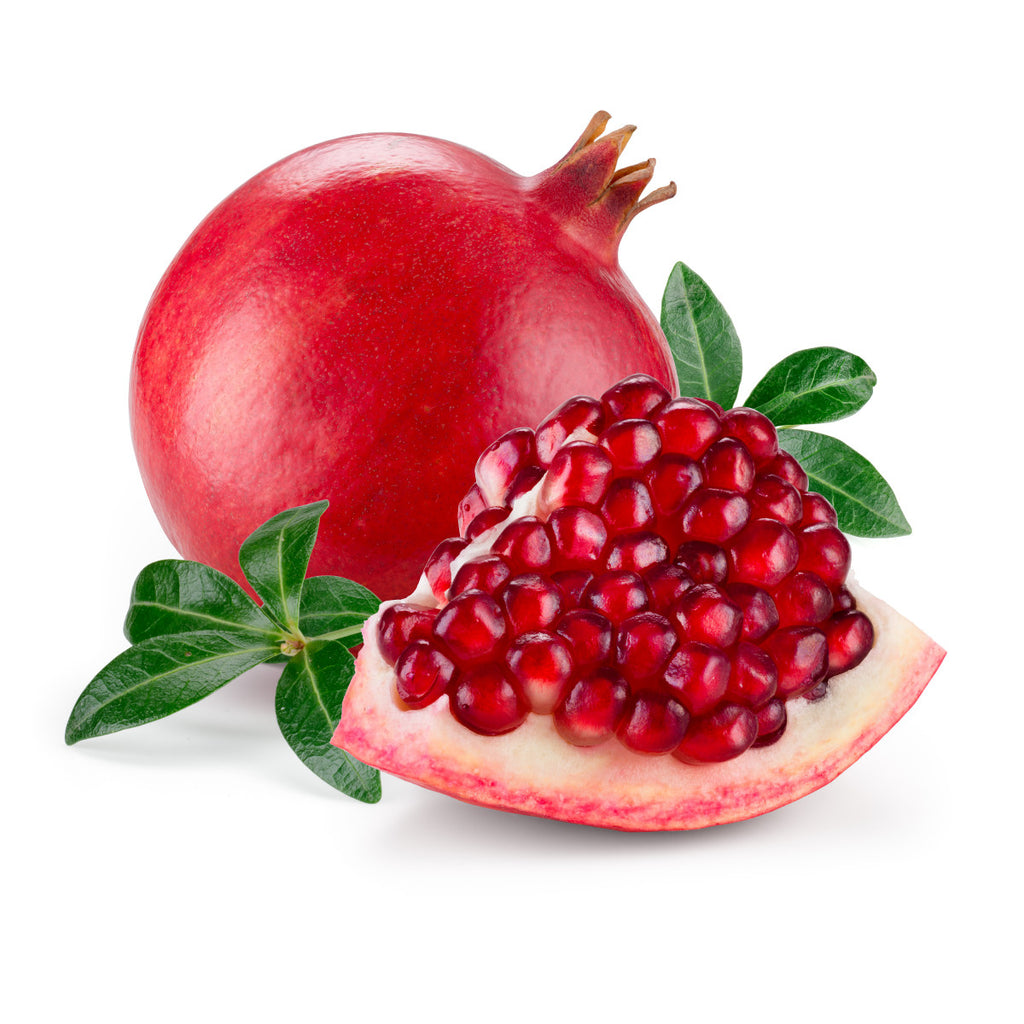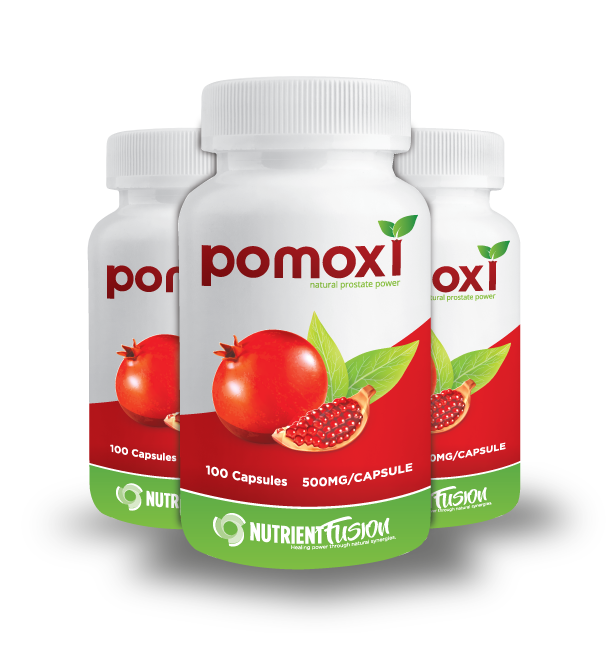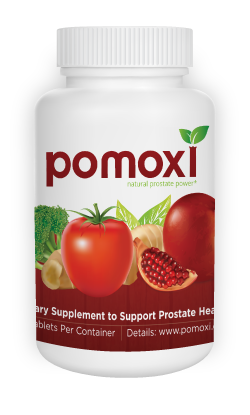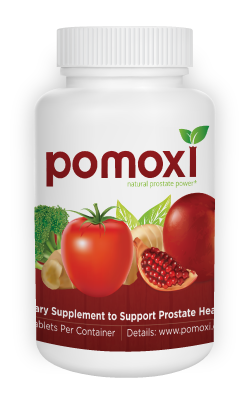Pomegranate
A delicious, ruby red fruit with powerful antioxidant properties. Pomegranates have long been used for their curative properties.

Subscribe and Save 15%
BUY NOW
The Science of Pomegranate
Recently, there has been a renewed push to identify natural remedies to support prostate health. Pomegranate juice and pomegranate extracts have prostate-specific health effects. Pomegranate fruit is derived from the tree Punica granatum, is edible and cultivated in numerous countries, including the U.S.
In clinical trials, Pomegranate extract has the property of slowing down PSA rates in men who have climbing PSA levels. Three key components of Pomegranate extract include luteolin, ellagic acid and punicic acid, when tested independently support prostate health by helping to decrease prostate cell migration. (1) Pomegranate actives are available in the human body and are detectable for up to 48 hours. (2)
Pomegranate extract reduces the levels of androgen genes. More recently, Pomegranate extract or juice was shown to reduce the production of testosterone and dihydrotestosterone (DHT) (3)
Pomegranate extract significantly reduces the level of secreted pro-inflammatory markers, namely IL-6, IL-12p40, IL-1β to support prostate cell health by modifying inflammatory signaling pathways. (1, 4)
Pomegranate extract support prostate health through multiple pathways, including androgen gene expression and inflammatory signaling routes. Its key components are proven clinically available in the body and in the prostate gland.
What is Pomegranate?
Pomegranate is a delicious ruby red fruit. In recent decades, it has been making a name for itself as a widely available antioxidant superfood, which makes it a great candidate for promoting prostate health.
Today, herbalists and alternative health practitioners alike employ many parts of this amazing fruit for a wide range of health concerns.
These health concerns include occasional digestive disorders, healthy blood pressure, and more. Modern studies have backed many of these uses over time – with very ripe potential for prostate health and a powerful ability to protect your entire body.
Taking a supplement containing the phytonutrients of the pomegranate can be an excellent choice, in tandem with other nutrients.
Pomegranate’s Compounds
Historically, many parts of the pomegranate were used – and not just the fruit! People would actually use the roots, bark, and flowers of the actual tree, along with the rinds, seeds, and the arils of the fruits for health support.
What are "arils"? That is actually the name for the edible part of the fruit – the juicy, sweet flesh encasing the seeds. Today, the other parts of the pomegranate are mostly discarded, which is why you may want to consider getting all of its nutrients in supplement form.
These nutrients are:
- Vitamins and minerals (vitamin C, B vitamins, potassium, phosphorus)
- Sugars (glucose, pectin, polysaccharides)
- Bioactive phytonutrients (polyphenols, flavonoids, anthocyanins, fatty acids)
Which of these are responsible for pomegranate’s prostate supporting properties?
That would be the phytonutrient polyphenols, flavonols, fatty acids, and anthocyanins.
Anthocyanins
Among pomegranate’s phytonutrients, anthocyanins are the most studied and appear to be the most powerful. These flavorful compounds are responsible for much of the fruit’s antioxidant content which prevents the development of the free radicals that can harm your body.
Polyphenols and Flavonols
Caffeic acid (a polyphenol) and luteolin (a flavonol) are also found in the fruits.
Fatty Acids
While pomegranates may not contain that healthy, much sought-after omega-3 fatty acid, they do contain their own unique fatty compound: punicic acid. It has many studied health benefits, namely supporting your overall health when working together with anthocyanins, polyphenols, and flavonols
All of these above phytonutrients can be found in actual pomegranate fruits and juices. When these phytonutrients are consumed, they can work together in different ways to support prostate health.
However, fortifying a diet with enough pomegranates to benefit your health can be quite a task for the average person – all the more reason to opt for an easy-to-take supplement of the fruit instead.
Using Pomegranate
To date, the use of pomegranate – whether eaten regularly as a fruit, or taken in its supplement form – yields no concerning side effects or adverse reactions. As such, getting the fruit's amazing benefits from its supplement form is considered completely safe.
Talk to your doctor about using Pomoxi, a completely natural supplement that not only contains pomegranate, but many other well-researched and promising natural ingredients.
References
1. Gonzalez-Sarrias, A, Gimenez-Bastida, JA, Garcia-Conesa, MT., et al. Occurrence of urolithins, gut microbiota ellagic acid metabolites and proliferation markers expression response in the human prostate gland upon consumption of walnuts and pomegranate juice. Mol Nutr Food Res. 2010 Mar;54(3):311-22.
2. Seeram NP, Henning SM, Zhang Y, Suchard M, Li Z, Heber D. Pomegranate juice ellagitannin metabolites are present in human plasma and some persist in urine for up to 48 hours. J Nutr. 2006 Oct;136(10):2481-5.
3. Longtin R. The pomegranate: nature’s power fruit? J Natl Cancer Inst. 2003; 95: 346–8.
4. Seeram NP, Adams LS, Henning SM, Niu Yantao, Zhang Y, Nair MG, Heber D. In vitro antiproliferative and antioxidant activities of punicalagin, ellagic acid and a total pomegranate tannin extract are enhanced in combination with other polyphenols as found in pomegranate juice. J Nutr Biochem.2005;16:360–7.


